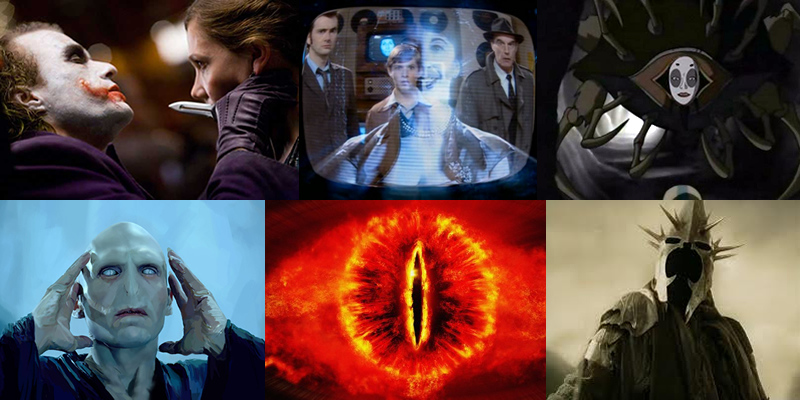The Faces Of Evil

In reality, depraved humans hide or destroy their faces while trying to steal and destroy the faces of the innocent.
But often we act like we don’t believe this.
Either we cannot believe such a horror exists, or we insist that such evil is not really evil. Sometimes we even claim such horrors are necessary to prevent other evils. And among these greater evils we may list either real evils, such as abuse, or else made-up evils, such as the cultural victory of a despised group—a group whose members either hurt them personally, or whose members remind them of people who hurt them personally.
Either way, the effect is the same.
People born with real faces exercise their choice to turn their faces away from this evil.
Maybe we act as I do. Maybe we try to hide our faces. Maybe we turn from reality and turn toward stories. Among these stories may be old and new classics of fantasy, science fiction, or paranormal/horror. The face-hider believes that in these stories lie new faces, friendly and distracting imaginary faces, who can make them laugh and swoon and cry. And forget.
But I’m afraid that if we turn their faces here, we will not find any escape.
For in fiction as in reality, depraved humans also hide or mutilate their true faces even as they try to steal and destroy the faces of the innocent.
Try to hide from evil by enjoying The Dark Knight films or other Batman stories that are even darker. But what will you find? The Joker, a madman whose story inspired a real-life mass shooting, has both hidden and mutilated his real face. His scars and makeup hide a farce that this is all a terrific distraction, a joke. “Why so serious?” As in many other Batman stories, The Joker lives to spread his mutilation and hiding. He slices the faces of his victims. He sets in motion events that split the face, and the soul, of district attorney Harvey Dent.
Too dark? We may opt for post-2005 Doctor Who stories. But from the Ninth Doctor’s first story onward, evil faces keep coming. They are wrapped in plastic, secreted within slimy brainy tentacles, or concealed behind the metallic masks of stomping upgraded zombies. One villain, The Wire, even thrives upon literally stealing the faces of others. And though the Doctor changes his face as a result of his regeneration, archvillain The Master uses his abilities to hide his face. He even creates a paradox machine to aid a horde of flying spheres that hide—what else?—the faces of mutilated humans that are no longer human.
Live-action stories let us down. Let’s try some animated fare, such as Avatar: The Last Airbender. I’m afraid the trend continues. Before the first season is over we have learned about Zuko, the Fire Prince wounded and cast out by his own father, who mutilated Zuko’s face. We also meet an evil spirit, Koh the Face-Stealer, who magically steals others’ faces.
Perhaps film and television, with their emphases on appearance, will constantly repeat the theme we would rather not face. Perhaps we should instead turn to notable fantasy books.
No solace here. Lord Voldemort hides his face on the back of another man’s face, then fake-resurrects himself only to bear the “face” of a serpent. The titular Lord of the Rings has no face but has been reduced to a single flaming Eye at the edge of consciousness. And his servants have also been hidden and mutilated: Ringwraiths, Orcs, the Mouth of Sauron.
But wait. Sometimes it’s not only villains but heroes who hide their faces. Like Black Riders, Strider wore a hood; Sam and Frodo wore Orc disguises to infiltrate Mordor. Superman, Batman and Spider-Man famously hide their faces and keep their identities secret.
But none of their faces are mutilated—and the stories constantly challenge their decisions. Why else is every Marvel Cinematic Universe hero so far without a secret identity?
It’s a fair question, one rightly asked often in superhero stories: Do heroes wear masks?
The answer: Yes, sometimes they do.
But heroes in masks usually long and work for a day when they can remove their masks.
Villains do not. They live to hide and mutilate their faces.
Then they do worse.
Because villains are themselves victims—of self-inflicted pain from their own choices—they must do two things. They must self-justify their own choices. And they must also make others “follow” in their hiding and mutilation. Just as a Creator wants to create beings who can themselves create, destroyers want to create devices for more destruction.
We can face this truth in fantastical fiction. We don’t look away. We may call it “realistic.”
So why would we refuse to face this truth in reality?










































I know—but part of the appeal of stories is that in real life, we rarely know what to do about evil when we’ve seen it. If we try to stand up and stop said evil, we are soon disabused of our heroic ideal. In real life we don’t get to be superheroes, we rarely even get to be legitimate troublemakers without causing other kinds of evil. There is rarely any sense of reality or validity about trying to do the right thing—it’s so fake, so awkward, so forced, so inconsequential.
Not sure we must be “superheroes” who confront end-of-the-world events or alien invasions. Only eyes to see hideous realities, and voices to condemn them for what they are—and refuse to cease in the face of rolled eyes on other faces.
Y’know, we can loop this back to the robot discussion from earlier and the nature of humanity. Put a face on a robot, and people tend to act as if it has personality: in some subconscious wibbley-woo way, the face is the symbol of humanness, humanity. To destroy or to take someone’s face is to dehumanize them. To do it to yourself means you no longer place yourself in the community of humans, you are literally making yourself inhuman.
That’s a great thought. I had not thought of the converse effect.
As villains hide their own faces and dehumanize other human beings by stealing their faces, likewise they also glue false faces onto things that are not human and claim that they are human.
And yes, by doing this the villain is refusing to concede that he/she is a human being or belongs in the community of human beings.
Perhaps this also is a truth that great stories reflect: that the hero in fighting or even violently punishing the villain is not automatically becoming “like him” (though the hero may also face this temptation). Instead the hero is simply fighting to fulfill a kind of law of nature (and to the Christian, of nature’s God): Villains who declare themselves outside of humanity also declare themselves outside the love of humanity’s Maker. Therefore they must be opposed and ultimately consigned to some kind of punishment.